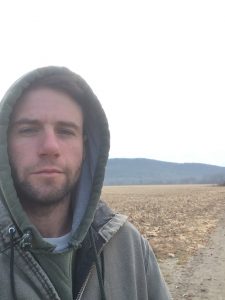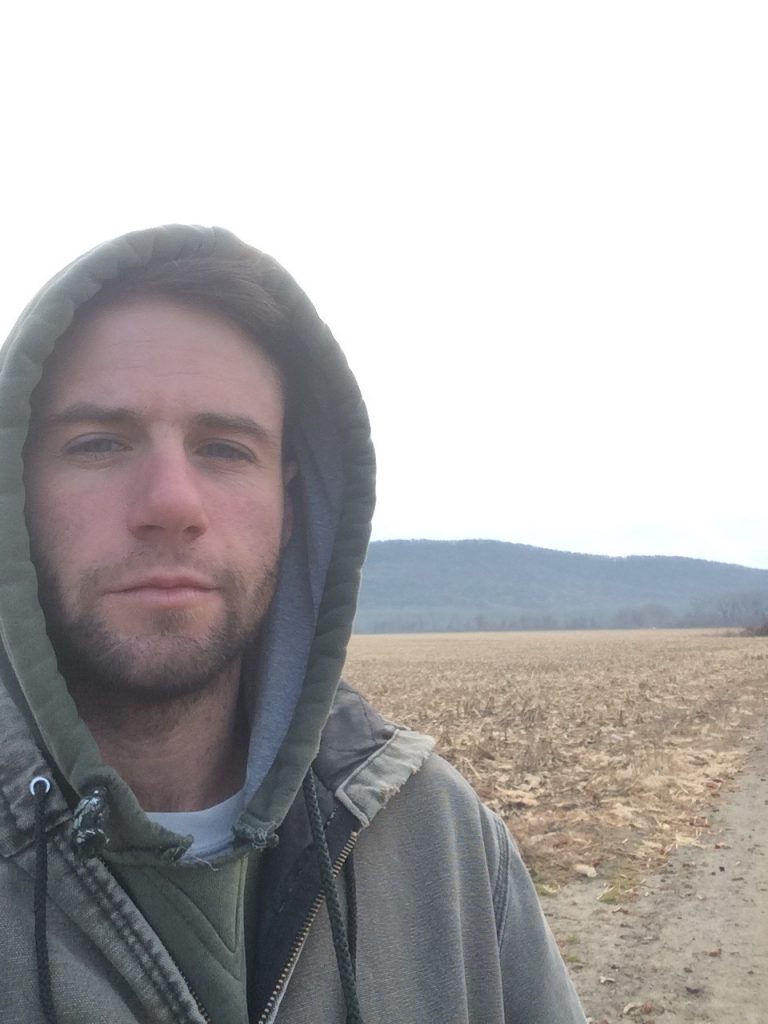Jasper Gardner, a 35-year-old Cummington resident who has worked as a farmer and carpenter in the Pioneer Valley, was recently awarded the 2018 Valley Advocate scholarship to the Juniper Summer Writing Institute at the University of Massachusetts Amherst for his creative nonfiction writing.

Jasper Gardner, a 35-year-old farmer and carpenter from Cummington, was awarded the 2018 Valley Advocate Scholarship to the Juniper Summer Writing Institute for his creative nonfiction writing. Photo courtesy of Jasper Gardner.
The Juniper Summer Writing Institute takes place from June 17 to 24 and brings together more than 100 poets and writers to learn, write, and share their work in a community of writers, according to a press release from the writing institute. Workshops in poetry, fiction, and memoir are the heart of the program, which includes engaging craft sessions and manuscript consultations. Evening readings are open to the public at 7:30 p.m. in the Bezanson Recital Hall of Fine Arts Center on the UMass Amherst campus.
Gardner, a trans man, told the Valley Advocate he grew up “trans and queer in rural Georgia” and his submission essay for the scholarship is in large part about his formative years.
“I tell the story of one night at a bar in the Missouri Ozarks, but interlace it with memories, philosophies, observations, and opinions from other various points in time,” he said. “It is an effort to understand the complexity of my position as both insider and outsider, as a subject of fascination and aggression, desire, and fear. ”
Gardner became interested in writing when he was 10 years old after winning a $50 prize in a writing contest.
“After receiving the award I exclaimed to my mom, in the middle of the quiet auditorium, ‘Now I can get SHOES!’ What had been a mother’s pride instantly turned to mortification; no one in earshot knew I had plenty of shoes at home, that I just wanted a particular pair. I don’t actually think there’s a correlation, but I haven’t gone public with my writing again until now,” he said.
Developing his submission for the summer writing institute has transformed his relationship to writing from a “solitary, agonized affair to a healthy love I’ve happily introduced to friends,” he said.
“I’ve read my work aloud to other writers, asked their opinions, and took their critiques (mostly) in stride,” Gardner said. “I’ve learned, or maybe remembered, that I enjoy the problem and puzzle of writing. Having had this taste of writing in community I know I need more of it if I’m going to extend further into my vulnerability, technique, and skill. I’m supremely grateful to the Valley Advocate and Juniper Summer Writing Institute for providing me the opportunity to do this.”
Betsy Wheeler, managing director of the institute, described Gardner’s creative nonfiction writing as “vividly detailed, searching, and vulnerable, and cannily observant.”
“We’re honored to partner with the Valley Advocate and recognize the many ways the Advocate contributes to our community, celebrates the arts, and attracts people to the region,” Jennifer Jacobson, director of the Juniper Summer Writing Institute and Juniper Institute for Young Writers, said. “This is the fourth year the scholarship has been awarded. Past recipients include Elinam Vanessa Agbo, an emerging fiction writer; Shana Haydock, a Mount Holyoke College graduate and an emerging poet; and Theresa MacPhail, a medical anthropologist and creative nonfiction writer.”
Below is a section of Gardner’s creative nonfiction submission to the writing institute:
Scorpions used to hide in the toes of our shoes so we had to check them. That was part of putting shoes on. The generous presence of poisonous snakes dictated my paths and at times took over my thoughts. My brother and I were cautioned not to reach into or under anything outdoors but I used to get a rush from turning over the flat rocks along the drive and looking for the patterned swirls of baby copperheads. Once my father killed a big rattlesnake in the garden, chopped its head with a shovel. Calling us over for a show and tell, he pointed at a nerf football-sized lump halfway down the length of the snake, which was probably in a digestive torpor when he found it. Using a pocket knife he gingerly sliced the belly to reveal a small rabbit, hairless now and a chemical-burn brown, but otherwise perfectly intact.
North Georgia is where the Appalachians begin and where the Cherokee Nation thrived before its devastation at the hands of white settlers and the federal government. It is a pretty region with much to offer in terms of landscape, but I haven’t been back in several years now, partly because my town has turned into a bedroom community for the bedroom communities nearer Atlanta. Last I was there, however, the wider county land was basically unchanged. Out past the box stores and “mountain homes” the countryside turns to low hills, oak and pine forests, and farmland in the bottoms. A little further north the hills start steepening into mountains, and laurel-lined trout streams feed into slower moving rivers below. Here and there old barns and sheds appear to be carelessly placed, scattered as if unearthed and abandoned like the result of some ectomy or another, pieces left on the operating tray for a nurse to dispose of after the doctor has given the news and gone home.
Chris Goudreau can be reached at cgoudreau@valleyadvocate.com.



